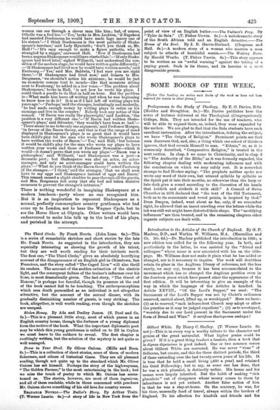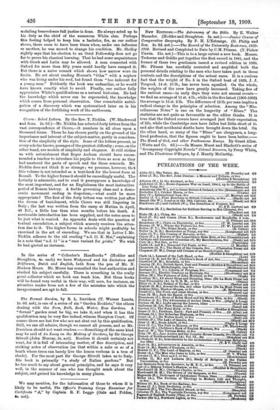Gilbert While. By Henry C. Shelley. (T. Werner Laurie. Be.
net.)—This is in every way a worthy tribute to the character and genius of the great naturalist. What higher praise could be given ? If it is a great thing taudari a laudato, then a book that is dignus dignissimo is good indeed. One or two common errors about Gilbert White are corrected. He was never " vicar " of Selborne, but curate, and this for three distinct periods, the third of these extending over the last twenty-seven years of his life. It is true that he held a small living (.630 a year) and retained his Oriel Fellowship ; but to say, as some one hail done, that he was a rich pluralist, is distinctly unfair. His house and his means were largely inherited. But the habit of making "rich pluralists" out of cleigymen whose- money comes to them by inheritance is not yet extinct. Another false notion of him is that he was a stay-at-home. On the contrary, he was, for his time, unusually fond of travel, always within the borders of England. To his affection for kinsfolk and friends and his
unfailing benevolence full justice is done. He always acted up to his duty as the chief of the numerous White clan. Perhaps this feeling helped to keep him a bachelor, for, as our author shows, there seem to have been times when, under one influence or another, he was moved to change his condition. Mr. Shelley rightly says that his election to an Oriel Fellowship does not go far to prove his classical learning. That he had some acquaintance with Greek and Latin may be allowed. A man connected with Oxford for more than fifty years could hardly have escaped it. But there is a naïve remark which shows how narrow were its limits. He set about reading Horace's "Odes " with a nephew who was living under his roof, but found them "too indecent for a young man." Evidently the book was unfamiliar, or he would have known exactly what to avoid. Finally, our author fully appreciates White's qualifications as a natural historian. He had the knowledge which never can be superseded, the knowledge which comes from personal observation. One remarkable antici- pation of a discovery which was systematised later on is his recognition of the fertilising work of the earthworm.











































 Previous page
Previous page